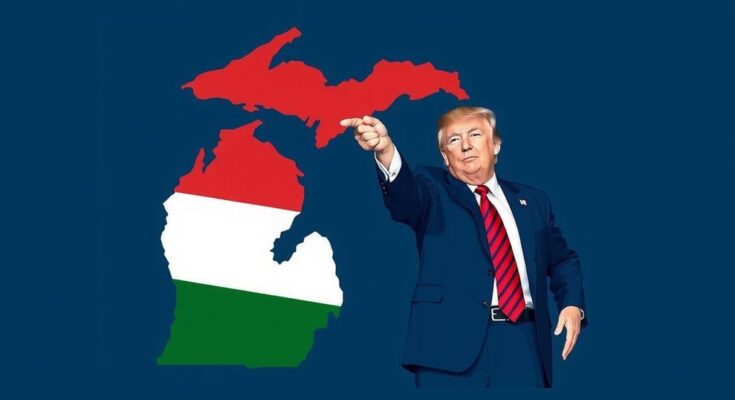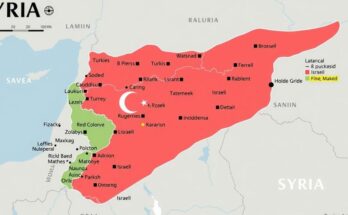Arab American voters in Michigan are increasingly supporting Donald Trump in the upcoming election, driven by discontent with the Biden administration’s policies towards Israel and the perception that the Democratic Party has neglected their interests. Notable community activists are vocal about their frustration with Vice President Kamala Harris, leading to a reevaluation of political loyalty among Arab Americans. This shift could significantly impact the electoral outcome in one of America’s key swing states.
In the lead-up to the United States elections, a notable shift is occurring within the Arab American electorate in Michigan, as many are gravitating toward former President Donald Trump. This trend is largely attributed to discontent with the current administration’s stance on the Israel-Palestine conflict, particularly under Vice President Kamala Harris. Samraa Luqman, a Yemeni American activist, expresses this sentiment, stating that should Harris fail to secure the presidency, the Arab community should be held accountable due to the Democrats’ historical neglect of Arab voters and the ongoing U.S.-backed conflict in Gaza and Lebanon. Luqman posits that Democrats have taken Arab voters for granted for too long and insists that the community must leverage its political influence to facilitate change. The dissatisfaction with President Joe Biden’s unwavering support for Israel has led some former Democrats to consider Trump’s promises of change—despite his controversial history of anti-Muslim rhetoric. In a visit to Dearborn, an Arab-majority city, Trump engaged with members of the Arab American community, reinforcing his strategy to appeal to disillusioned voters. Despite the challenges of Trump’s record, some in the community view voting for him as a necessary gamble, believing that the risk may yield better outcomes for peace in the Middle East compared to what they perceive as the certainty of continued aggression under Harris’s policies. The support for Trump extends beyond grievances surrounding the Israeli-Palestinian conflict, touching on a broader discontent with Democratic policies. Notably, Mayor Bill Bazzi of Dearborn Heights, along with others, endorses Trump’s promise of peace, contrasting it with the ongoing turmoil provoked by the current administration’s policies. While Trump’s engagement with the Arab community reflects an unprecedented political alignment, critics highlight the contradictions between his rhetoric and record, especially regarding his previous actions against Arab and Muslim interests. The diverse perspectives within the community underscore a complex electoral landscape that could significantly influence the outcome of the Michigan election, as Arab Americans assert themselves as a pivotal voting bloc.
The Arab American community in Michigan, particularly in cities like Dearborn and Hamtramck, has historically aligned with the Democratic Party, primarily due to issues surrounding civil rights and social justice. However, anger over the Biden administration’s unyielding support for Israel during the recent conflicts has led to a reevaluation of loyalties. Activists such as Samraa Luqman are vocal about their dissatisfaction with current policies and the perceived betrayal by Democratic leadership. The community’s response to Trump’s outreach indicates a desire for change, challenging the long-standing assumptions about political allegiance among Arab voters. This shift is significant, as Michigan is regarded as a swing state where the Arab American electorate could play a decisive role in determining the outcome of the election.
In summary, the increasing support for Donald Trump among Arab American voters in Michigan illustrates a profound shift in political allegiances driven by dissatisfaction with current Democratic policies regarding the Israel-Palestine conflict. Activists like Samraa Luqman exemplify a growing movement within the community that seeks to hold political leaders accountable, while others view affiliation with Trump as a calculated risk for potential change. The intersection of local dynamics, including the influential roles of community leaders and the social issues impacting their constituents, will undoubtedly shape the electoral landscape in the upcoming election, as Arab voters aim to assert their influence and redefine their political significance.
Original Source: www.aljazeera.com




